Indiana University Press is proud that our books have received over 60 awards (and counting!) during the 2020-2021 calendar year. Many congratulations to our well-deserving authors!
Award-Winning Books
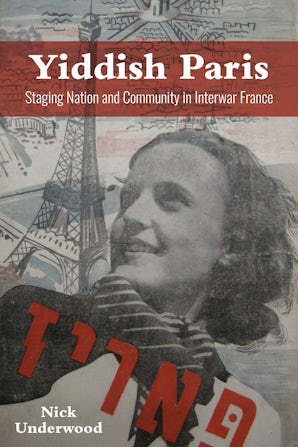
Runner-up: Jewish Book Award - WRITING BASED ON ARCHIVAL MATERIAL
Yiddish Paris
Staging Nation and Community in Interwar France
Nick Underwood
Yiddish Paris explores how Yiddish-speaking emigrants from Eastern Europe in Paris in the 1920s and 1930s created a Yiddish diaspora nation in Western Europe and how they presented that nation to themselves and to others in France.
In this meticulously researched and first full-length study of interwar Yiddish culture in France, author Nicholas Underwood argues that the emergence of a Yiddish Paris was depended on "culture makers," mostly left-wing Jews from Socialist and Communist backgrounds who created cultural and scholarly organizations and institutions, including the French branch of YIVO (a research institution focused on East European Jews), theater troupes, choruses, and a pavilion at the Paris World's Fair of 1937.
Yiddish Paris examines how these left-wing Yiddish-speaking Jews insisted that even in France, a country known for demanding the assimilation of immigrant and minority groups, they could remain a distinct group, part of a transnational Yiddish-speaking Jewish nation. Yet, in the process, they in fact created a French-inflected version of Jewish diaspora nationalism, finding allies among French intellectuals, largely on the left.
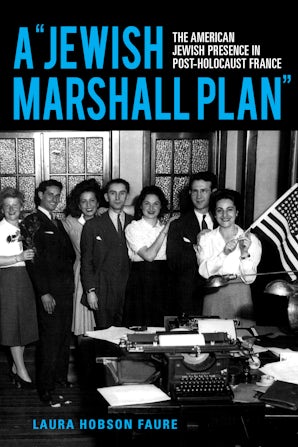
Winner: Jewish Book Award - WRITING BASED ON ARCHIVAL MATERIAL
A "Jewish Marshall Plan"
The American Jewish Presence in Post-Holocaust France
Laura Hobson Faure
While the role the United States played in France's liberation from Nazi Germany is widely celebrated, it is less well known that American Jewish individuals and organizations mobilized to reconstruct Jewish life in France after the Holocaust. In A "Jewish Marshall Plan," Laura Hobson Faure explores how American Jews committed themselves and hundreds of millions of dollars to bring much needed aid to their French coreligionists.
Hobson Faure sheds light on American Jewish chaplains, members of the Armed Forces, and those involved with Jewish philanthropic organizations who sought out Jewish survivors and became deeply entangled with the communities they helped to rebuild. While well intentioned, their actions did not always meet the needs and desires of the French Jews.
A "Jewish Marshall Plan" examines the complex interactions, exchanges, and solidarities created between American and French Jews following the Holocaust. Challenging the assumption that French Jews were passive recipients of aid, this work reveals their work as active partners who negotiated their own role in the reconstruction process.
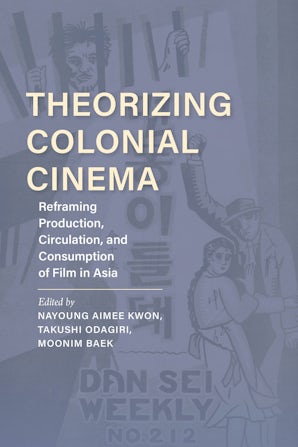
Winner: SCMS Best Edited Collection Award
Theorizing Colonial Cinema
Reframing Production, Circulation, and Consumption of Film in Asia
Nayoung Aimee Kwon, Takushi Odagiri, Moonim Baek, Nadine Chan, Aaron Gerow, Jane Marie Gaines, Zhen Zhang, Thomas A. C. Barker, Nikki J. Y. Lee, José B. Capino, Yiman Wang
Theorizing Colonial Cinema is a millennial retrospective on the entangled intimacy between film and colonialism from film's global inception to contemporary legacies in and of Asia.
The volume engages new perspectives by asking how prior discussions on film form, theory, history, and ideology may be challenged by centering the colonial question rather than relegating it to the periphery. To that end, contributors begin by excavating little-known archives and perspectives from the colonies as a departure from a prevailing focus on Europe's imperial histories and archives about the colonies. The collection pinpoints various forms of devaluation and misrecognition both in and beyond the region that continue to relegate local voices to the margins.
This pathbreaking study on global film history advances prior scholarship by bringing together an array of established and new interdisciplinary voices from film studies, Asian studies, and postcolonial studies to consider how the present is continually haunted by the colonial past.
Winner of the SCMS Best Edited Collection Award!
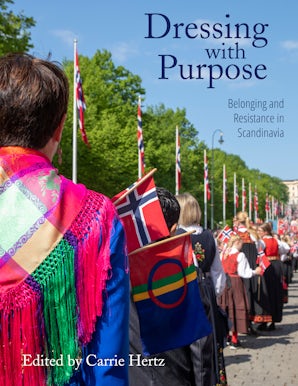
Winner: Elli Köngäs-Maranda Prize
Dressing with Purpose
Belonging and Resistance in Scandinavia
Carrie Hertz
Dress helps us fashion identity, history, community, and place. Dress has been harnessed as a metaphor for both progress and stability, the exotic and the utopian, oppression and freedom, belonging and resistance. Dressing with Purpose examines three Scandinavian dress traditions—Swedish folkdräkt, Norwegian bunad, and Sámi gákti—and traces their development during two centuries of social and political change across northern Europe.
By the 20th century, many in Sweden worried about the ravages of industrialization, urbanization, and emigration on traditional ways of life. Norway was gripped in a struggle for national independence. Indigenous Sámi communities—artificially divided by national borders and long resisting colonial control—rose up in protests that demanded political recognition and sparked cultural renewal. Within this context of European nation-building, colonial expansion, and Indigenous activism, traditional dress took on special meaning as folk, national, or ethnic minority costumes—complex categories that deserve reexamination today.
Through lavishly illustrated and richly detailed case studies, Dressing with Purpose introduces readers to individuals who adapt and revitalize dress traditions to articulate who they are, proclaim personal values and group allegiances, strive for sartorial excellence, reflect critically on the past, and ultimately, reshape the societies they live in.
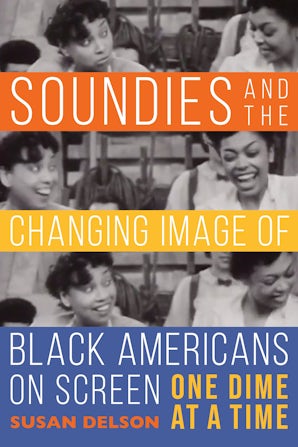
Winner: Outstanding Academic Title
Soundies and the Changing Image of Black Americans on Screen
One Dime at a Time
Susan Delson
In the 1940s, folks at bars and restaurants would gather around a Panoram movie machine to watch three-minute films called Soundies, precursors to today's music videos. This history was all but forgotten until the digital era brought Soundies to phones and computer screens—including a YouTube clip starring a 102-year-old Harlem dancer watching her younger self perform in Soundies.
In Soundies and the Changing Image of Black Americans on Screen: One Dime at a Time, Susan Delson takes a deeper look at these fascinating films by focusing on the role of Black performers in this little-known genre. She highlights the women performers, like Dorothy Dandridge, who helped shape Soundies, while offering an intimate look at icons of the age, such as Duke Ellington and Nat King Cole. Using previously unknown archival materials—including letters, corporate memos, and courtroom testimony—to trace the precarious path of Soundies, Delson presents an incisive pop-culture snapshot of race relations during and just after World War II.
Perfect for readers interested in film, American history, the World War II era, and Black entertainment history, Soundies and the Changing Image of Black Americans on Screen and its companion video website (susandelson.com) bring the important contributions of these Black artists into the spotlight once again.






